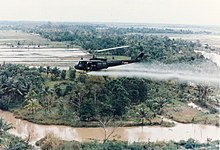Military context

While demands for agricultural and urban use for the human population cause the preponderance of deforestation, military causes can also intrude. One example of deliberate deforestation played out in the U.S. zone of occupation in Germany after World War II ended in 1945. Before the onset of the Cold War, defeated Germany was still considered a potential future threat rather than a potential future ally. To address this threat, the victorious Allies made attempts to lower German industrial potential, of which forests were deemedby whom? an element. Sources in the U.S. government admitted that the purpose of this was that the "ultimate destruction of the war potential of German forests". As a consequence of the practice of clear-felling, deforestation resulted which could "be replaced only by long forestry development over perhaps a century".
Operations in war can also cause deforestation. For example, in the 1945 Battle of Okinawa, bombardment and other combat operations reduced a lush tropical landscape into "a vast field of mud, lead, decay and maggots".
Deforestation can also result from the intentional tactics of military forces. Clearing forest became an element in the Russian Empire's successful conquest of the Caucasus in the mid-19th century. The British (during the Malayan Emergency) and the United States (in the Korean War and in the Vietnam War) used defoliants (like Agent Orange or others).need quotation to verify
Comments
Post a Comment